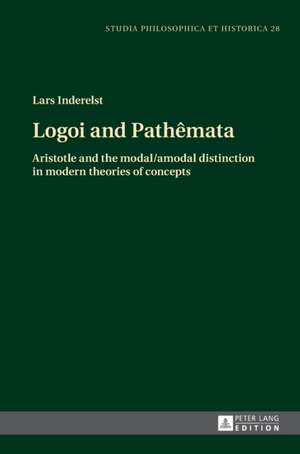Logoi and Pathêmata: Studia philosophica et historica
Autor Lars Inderelsten Limba Engleză Hardback – 16 iul 2017
Concept is a central notion in modern philosophy that also influences other disciplines like psychology and linguistics. The author compares modern theories to the work of Aristotle as the first philosopher with an extensive corpus and one of the predecessors both of classical theory and of modal theories of concepts . It is surprising that there is no equivalent term for concept in his work. Both pathma and logos are central to his theory of language and thought. Therefore, this book describes which notion in Aristotle's writing comes closest to concept and whether or not it generates a precise theory.
Preț: 489.59 lei
Preț vechi: 635.84 lei
-23% Nou
Puncte Express: 734
Preț estimativ în valută:
93.73€ • 97.79$ • 78.57£
93.73€ • 97.79$ • 78.57£
Carte tipărită la comandă
Livrare economică 12-26 martie
Preluare comenzi: 021 569.72.76
Specificații
ISBN-13: 9783631676790
ISBN-10: 3631676794
Pagini: 307
Dimensiuni: 151 x 213 x 26 mm
Greutate: 0.56 kg
Ediția:Nouă
Editura: Peter Lang Copyright AG
Seria Studia philosophica et historica
ISBN-10: 3631676794
Pagini: 307
Dimensiuni: 151 x 213 x 26 mm
Greutate: 0.56 kg
Ediția:Nouă
Editura: Peter Lang Copyright AG
Seria Studia philosophica et historica
Notă biografică
Lars Inderelst studied philosophy and classics at the University of Düsseldorf and is specialized in ancient philosophy. As a researcher he was part of the interdisciplinary research center CRC 991 "The Structure of Representations in Language, Cognition, and Science" and compared positions from the history of philosophy to very recent trends in cognitive science such as frame-theory and embodied cognition.
Descriere
"Concept" is a central notion in modern philosophy. This book deals with the philosopher Aristotle to compare modern theories of "concepts" as he is said to be the predecessor both of classical theory and of modal theories of "concepts" in the modern debate. Both pathema and logos are central to his theory of language, thought, and concepts.

